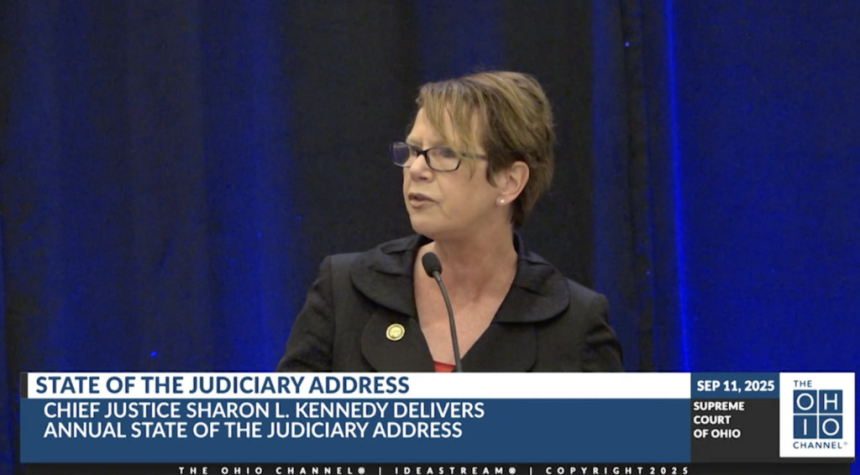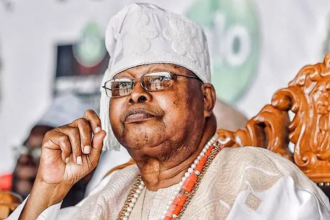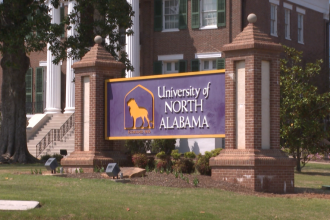Ohio Supreme Court Chief Justice Sharon Kennedy gives remarks to the Ohio Judicial Conference on the state of the judiciary. (Screenshot courtesy of The Ohio Channel)
In the annual State of the Judiciary speech, Ohio Supreme Court Chief Justice Sharon Kennedy pushed for more civics education, committed to eliminating “legal deserts,” and emphasized the importance of an independent judicial branch of government.
“Preservation of judicial independence is founded on public trust,” Kennedy told the Ohio Judicial Conference on Thursday. “That trust grows when we innovate to address the underlying causes of crime, wholly open our courthouses to all, proactively tackle our solemn responsibilities in the administration of justice and build a bright, bold future for the legal profession in Ohio.”
Before she began her prepared remarks, Kennedy asked the conference for “indulgence,” in which she called for a moment of silence for the victims and families on the anniversary of the 9/11 attacks.
She asked for a second moment of silence in honor of Charlie Kirk, a right-wing political activist who was fatally shot at a college campus event in Utah on Wednesday.
In asking for the moment of silence for Kirk, Kennedy said “as people we come from all different walks of life, from different faiths, from different political views and perspectives, but what binds us together is humanity.”
The chief justice added that “robust debate of differing viewpoints is essential to a free and civil society.”
Quoting former U.S. Supreme Court Justice Louis Brandeis, she said of exposing “falsehoods and fallacies,” that “the remedy to be applied is more speech, not enforced silence.”
The Republican chief justice was elected to the seat in November 2022, as only the second woman to serve, succeeding fellow Republican Chief Justice Maureen O’Connor.
She was first elected to the bench in 2012, having worked in Butler County’s court system before that.
SUBSCRIBE: GET THE MORNING HEADLINES DELIVERED TO YOUR INBOX
The Ohio Supreme Court is the highest court in the state, hearing appeals from lower courts primarily on cases that involve the state constitution, death sentence appeals and appeals from the Public Utilities Commission of Ohio.
The court has discretion to accept any case it deems “of public or great general interest.”
The court saw multiple cases related to the state’s redistricting battle over the last four years, and stands as the court of jurisdiction if the upcoming congressional redistricting map is legally challenged.
Speaking to the members of the Ohio Judicial Conference, Kennedy credited them for maintaining the judicial independence of the state’s many different courts, from common pleas to municipal courts, and she spotlighted the specialized dockets that focus on topics such as drug addiction and mental health challenges.
“Ohio’s judiciary has long been the beacon of independence and with that independence comes the freedom to innovate,” Kennedy said. “(Specialized dockets) are not just about accountability, they are about healing, second changes and hope.”
The justice system’s independence must rely on impartiality and universal accessibility, according to the chief justice, along with a renewed effort to complete cases in a timely manner.
“When cases languish, justice delayed becomes justice denied,” Kennedy told the conference.
Improving the movement of cases through the system and the access to proper representation must include eliminating “legal deserts.”
In order to do that, the system needs to focus not only on recruiting more attorneys to the field, but also preparing those attorneys. She likened the future of law to residencies and fellowships in the medical field.
“We must be speaking to young people to spark an interest in them to become an attorney,” Kennedy said, while also saying work must be done to “enhance the life cycle of an Ohio attorney.”
Touching further on the importance of public trust in the judiciary, the chief justice said the supreme court is holding its own events to run alongside the 250th anniversary of the signing of the Declaration of Independence next year.
That includes exhibits on women in law and displays of foundational documents like the Declaration of Independence and the Ohio Constitution.
The supreme court building is also giving tours after hours, and the justices are holding some oral arguments in off-site locations.
She encouraged attorneys and judges across the state to be involved in educating the public on their branch of government, through organized events or even visits to schools.
“All civic education, no matter how small, how big, is an act to promote and restore trust and it is a giant step forward to preserving judicial independence into the future,” Kennedy said.









